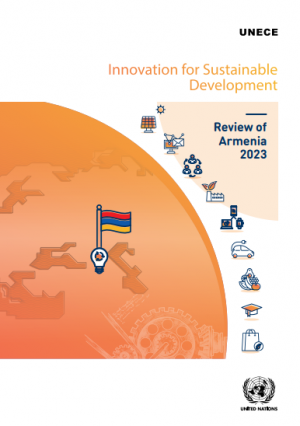Despite geopolitical and economic instability since gaining independence, Armenia has become one of the regional leaders in innovation, especially, but not only, in the IT service sector. The past two decades alone have seen the creation of more than 1,000 start-ups providing a range of IT services and developing new, innovative products on their own. The sector grew from 1.2% of GDP in 2010 to 5.1% in 2020.
This success demonstrates Armenia’s potential for innovation-driven sustainable development through the IT sector and beyond. Several factors underpin this potential including some of the highest education levels in the region, a strong culture of entrepreneurship, and a high-level political commitment to innovation.
As indicated in the UNECE Innovation for Sustainable Development Review (I4SDR) of Armenia, a series of ambitious reforms have radically improved the business environment, especially for high-risk ventures, over the past years. The newly established Ministry of High-Tech Industry further introduced several policies and support mechanisms to promote innovation infrastructure and commercialization. In addition, a truly catalytic potential lies within the skilled and successful Armenian diaspora. Numbering between 3 and 10 million people and spread across 100 countries, the highly engaged diaspora can contribute networks, ideas, skills, and finance to support innovation.
Nevertheless, maintaining, spreading, and reinforcing this momentum calls for supporting innovation in all sectors of economy and addressing structural economic constraints. These include high levels of unemployment and underemployment, inequality in access to opportunities, a living standard gap, low market competitiveness, and a narrow export basket. Other issues such as reliance on low value-added activities, for example, in the agriculture sector, and low economic productivity impede the creation of high-quality jobs.
In this context, fostering innovation systematically across the economy is necessary to empower both the public and private stakeholders to explore new ways of generating value and finding solutions to these issues.
“Getting innovation governance and support mechanisms right is not easy. Innovation governance must support trying out, piloting, and learning from ideas. That is at the core of our review. Innovation is indeed unpredictable and risky, but these risks also open up opportunities for great rewards. We see this in the remarkable growth of the IT sector in Armenia, a testament to the innovation potential of the country,” said UNECE Executive Secretary Olga Algayerova.
Boosting innovation in Armenia: The way forward
The challenge of supporting countries in harnessing the potential of innovation lies in understanding how innovation works and what public support can and cannot accomplish. There are no recipes or easy answers for successful innovation governance. Nonetheless, there is a wealth of examples and case studies of how other countries have addressed these issues. This knowledge has been accumulated by UNECE experts over several decades of informal and inter-governmental dialogue and exchange. Understanding the specific opportunities and constraints on innovation in each country and applying lessons learned from other economies with similar challenges is the fundamental requirement for designing effective support.
The UNECE I4SDR for Armenia constitutes an essential milestone in the country’s journey toward sustainable development and enhanced innovation capabilities. Improving on the methodology of the first UNECE review for Armenia (2014) and building on the wealth of best-practice knowledge, UNECE worked closely with three Armenian ministries - the Ministry of Economy, the Ministry of High-Tech Industry, and the Ministry of Education, Science, Culture and Sport - in a uniquely cooperative and coordinated process. The review involved an extensive in-person mission during which UNECE experts met with more than 100 stakeholders from the private and public sectors, academia, and international organisations. The report also underwent two rounds of peer review, ensuring a thorough analysis of Armenia's current innovation landscape.
Areas for improvement
The thorough fact-finding process for the report revealed several findings that will be at the core of discussions during the high-level launch on 7 June in Yerevan and online. Central recommendations of the report include: Addressing limited funding availability for innovation and research, integrating and coordinating innovation support initiatives across the different sectors and ministries, and improving the quality of education and training programmes to reflect the needs of the labour market.
One future priority identified by UNECE is increasing the currently limited capacity of the private sector to absorb and implement new technologies. This issue, combined with low levels of R&D investment and underdeveloped science-industry linkages, leaves the economy's commercialization potential untapped.
Another priority relates to innovation infrastructure. UNECE analysis points to the need for an overarching strategic vision and greater coordination to address the issues of talent retention and lack of support for non-ICT start-ups.
A third addresses the policy level, where the UNECE analysis reveals the need for a unified innovation policy strategy, improved inter-ministerial coordination, and more attention to process innovation in less productive sectors like agriculture. Armenia should also focus on collecting and using statistics for assessing policies and their implementation.
Lastly, the report identifies opportunities in further tapping into the potential of Armenia’s highly skilled diaspora through systematic support for diaspora engagement in innovation.
Looking forward, the implementation of the I4SDR's recommendations and potential capacity-building efforts will play a crucial role in addressing the identified challenges and driving further innovation-led sustainable development in Armenia. The aim is not only to address current challenges but also to build a robust innovation ecosystem that can adapt and thrive in the face of future changes and opportunities.
For more information visit: https://unece.org/economic-cooperation-and-integration/events/high-level-launch-innovation-sustainable-development


